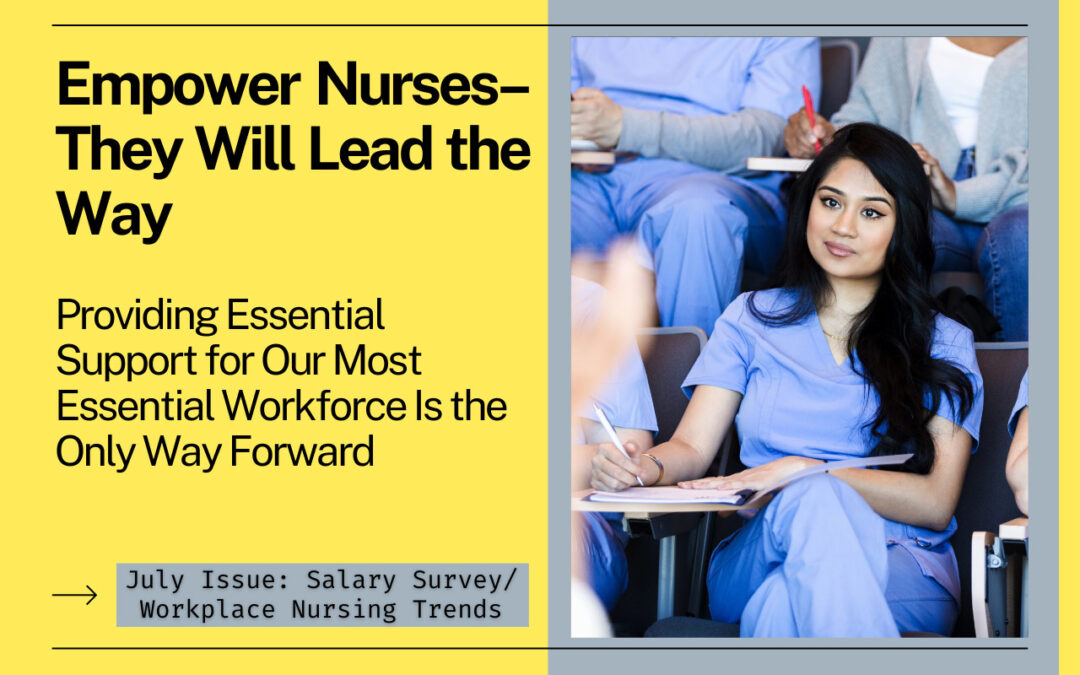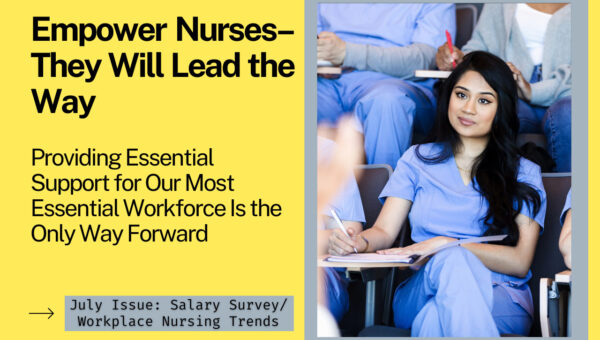Nursing is more than a profession. It’s a calling. And those who answer the call become the backbone of a high-functioning, compassionate health care system. People who become nurses are capable, compassionate, and strong scientists and clinicians who have worked hard to start their careers. Their expertise, patient care delivery, and commitment to the profession contribute a distinct perspective on how health care should be managed and delivered.
While nurses are strong and resilient, they can’t fix their biggest problem: a dire nursing shortage. A decade in the making, our national nursing shortage threatens our already struggling health care infrastructure. Studies have long predicted
that the demand for nurses would intensify as the U.S. population aged. And just like the trends in general higher education, nursing schools have become less accessible, as many face faculty shortages, limits on enrollment, and limited space for clinical training at teaching hospitals.And, of course, the COVID-19 pandemic only accelerated these trends. Nurses came under incredible pressure from the increase in patient numbers and acuity, and public distrust surrounding politicized vaccines and treatments, with a large number of their peers opting to leave the field due to these pandemic stressors. The nurses who remain find themselves in professional limbo, looking for ways to squeeze in continued education and professional development, manage work demands and challenges, and find a healthy work-life balance.
And that is if they chose to stay. A staggering number of nurses have decided to leave. The total number of registered nurses in the workplace decreased by more than 100,000 in 2021, the most significant drop observed in four decades. The largest group to depart was nurses under 35.
We need to do everything in our power to create sustainable solutions that don’t simply “put nurses on floors” but will provide our nurses with the best possible experience, one that allows them to practice at the top of their license. The circumstances are challenging, and there’s no quick fix, but our patients, our communities, our health systems––health care itself can’t afford to continue in this direction.
At Trinity Health, we started developing solutions well before the pandemic and have seen first-hand how thoughtful solutions, informed and led by nurses, impact job satisfaction most. Programs that give nurses greater flexibility and options based on where they are in their career and what they want to do, innovative care delivery models that support their work and provide opportunities for professional development, continuing education, and alternative career pathways work.
Supporting Education and Career Advancement
Starting a career in nursing is no simple endeavor. So, when entry-level nurses are just beginning, it’s critical to jump on the moment’s excitement and encourage them to dive as deep into their new role as possible. In 2014 we collaborated with Vizient, the country’s largest member-owned health care services company, to create our Nurse Residency Program. This program helps orient entry-level nurses as they transition into practice. The evidence-based curriculum incorporates three key areas: patient outcomes, leadership, and professional development.
For experienced nurses, we provide a robust system-wide learning platform for those interested in advancing their skills in various areas of practice specialization. Obtaining the highest level of education doesn’t just support their careers and livelihoods, but it helps us ensure we provide the best patient care possible.
Opportunity must be equitable, and we are committed to living Trinity Health’s values of equity, diversity, and inclusion in everything we do. Unequal access to education, specifically for underrepresented communities, is a well-documented barrier for students who wish to pursue a nursing degree. To that end, we provide tuition assistance, flexible online programming through our nursing schools and seven academic partner schools, scholarships, on-the-job training, and career advancement programs to help level the playing field for nurses from diverse backgrounds. This is crucial for delivering health care that is representative of the populations we serve.
Multiple Options to Support Work-Life Balance
Nurses especially need work-life balance. Options for flexibility and roles that match their needs and goals are essential to increasing the longevity of a fulfilling and meaningful career.
Nurses at Trinity Health led the development of FirstChoice, our internal staffing agency that offers flexible scheduling and travel opportunities for nurses and clinical staff. Having our pool of travel nurses helps prevent colleague burnout and maintains continuity in patient care. In addition to FirstChoice, we’ve introduced a new care delivery model to improve patient care, experience, and nurse satisfaction. The delivery model has been well-received by nurses who are early in their careers and benefit from the unique mentoring experience and from more tenured nurses who can continue to work in a less physically demanding but gratifying capacity.
Beyond flexibility, we must provide other ways to support nurses’ well-being and resilience. A recent study reports that a quarter to half of the nurses reported feeling emotionally drained (50.8%), used up (56.4%), fatigued (49.7%), burned out (45.1%), or at the end of the rope (29.4%) multiple times a week. Mental health benefits are an essential requirement once considered a luxury perk or not considered at all. We began offering Colleague Care Resiliency Rounding, a real-time, one-on-one, human connection for colleagues in high-volume, highly demanding areas within the hospital setting. The program’s goal is to address mental health proactively and sustain their mental well-being in the face of the inevitable stress of the job.
To ensure that there are no barriers to mental health support, we offer six free therapy sessions and six free coaching sessions per calendar year, as well as options for personalized care, access to diverse providers, self-guided wellness exercises, personal medication management training, substance use support, work-life services, and more.
When someone is a nurse, their career can easily become their identity. Nurses love their job, and we love them for that. But we must recognize that every nurse is more than the exceptional care they give to patients. They are whole humans with lives away from the bedside. They need support that is designed with that in mind.
Empowering Nurses
Nurses have long been renowned for confidently taking control of situations many shy away from. While I firmly believe it’s up to administrators and health systems to provide the essential support nurses need to thrive, I also know nurses must have a hand shaping their work lives. From my 40 years of experience as a nurse, with nearly 30 of those as a chief administrator, here is my advice to nurses searching for a career that will meet their personal and professional needs and goals.
Find an organization that shares your values. Look at the organization’s mission, vision, and values. Does it align with your own? Can you see evidence of their commitment to these values? Make sure the operational structure meets your needs. Does flexibility matter? Ask about shift offerings, virtual opportunities, or options to work in multiple locations. Do you care about mental health access? See what benefits they offer from day one.
Make sure the organization will truly see you and hear you. Your input is key to creating improved work environments and patient care. You must feel nothing less than supported in asking questions and contributing your voice to the conversation.
Whatever stage of your career––recently graduated or 20 years in––make sure an employer is willing to support your professional development. Opportunities for a new nurse should look vastly different than those for someone who has spent decades in a specialized unit. Ensure you can access individualized educational opportunities that impact your career trajectory and help you meet your goals.
I can only speak for myself and my team, but until all nurses feel adequately supported, I won’t rest my case that urgent action needs to be taken. Patients’ lives depend on our ability to care for and empower the people who care for them.
I am encouraged by my colleagues who have taken notice and have started to make meaningful changes. Nurses have been through a lot in the past few years, and we never know what awaits around the corner. But a positive shift is coming. The momentum we’ve built so far must continue so that the next generation of nurses feels more supported, better equipped, and more passionate about their calling than they ever dreamed possible.




